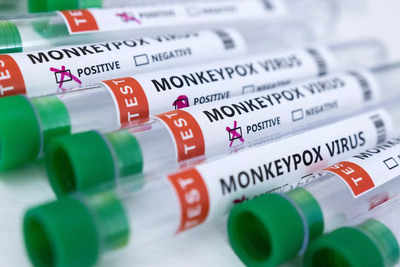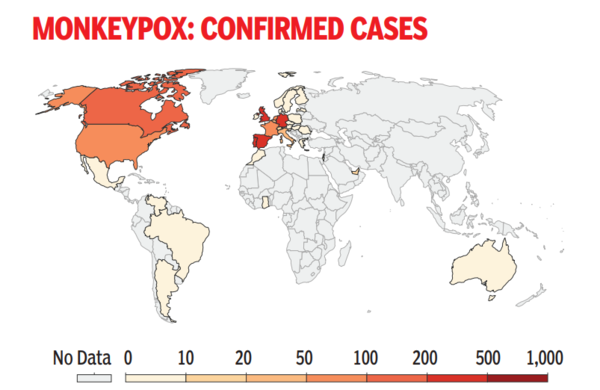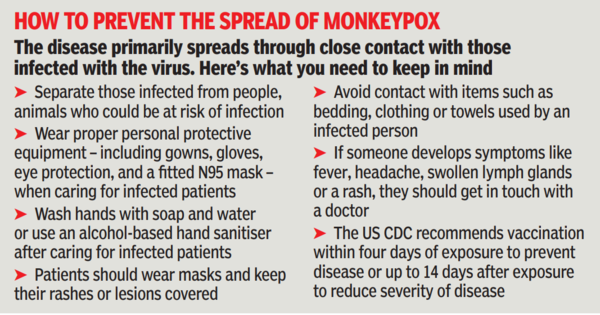- News
- India News
- Explainer: Why WHO is probing if Monkeypox needs global health emergency tag
Trending
This story is from June 16, 2022
Explainer: Why WHO is probing if Monkeypox needs global health emergency tag
The World Health Organization is convening a meeting of experts on June 23 to decide whether monkeypox needs to be declared a global health emergency like it had to do with Covid-19 over two years back. Unlike the novel coronavirus though, monkeypox is not a new disease. But while it has been around for decades, the appearance of cases where monkeypox is not usually seen and the manner of its spread have fuelled concern

The World Health Organization is convening a meeting of experts on June 23 to decide whether monkeypox needs to be declared a global health emergency like it had to do with Covid-19 over two years back. Unlike the novel coronavirus though, monkeypox is not a new disease. But while it has been around for decades, the appearance of cases where monkeypox is not usually seen and the manner of its spread have fuelled concern
Where Have Cases Been Reported?
Since May 13, more than 1,600 confirmed and about 1,500 suspected cases of monkeypox have been reported to WHO from at least 39 countries. Seven of these are African countries where the disease is endemic while the remaining are those where the disease was either not known to occur or has been previously detected only in minuscule numbers.
Seven of these are African countries where the disease is endemic while the remaining are those where the disease was either not known to occur or has been previously detected only in minuscule numbers.
A total of 72 deaths have been reported in 2022 due to monkeypox, all of them confined to Africa and none so far in the newly affected countries. WHO said the appearance of monkeypox simultaneously in places without direct or recent travel links to areas where the disease is endemic “suggests that there may have been undetected transmission for several weeks or longer”. The recent cases are linked to a less lethal variant of monkeypox known as the West Africa clade, which has an overall mortality of fewer than one in a hundred cases.

Does Sexual Contact Have A Role?
Monkeypox is transmitted through close physical contact with a symptomatic patient. However, it is not clear whether people who do not have symptoms can spread the disease. WHO said person-to-person transmission can also occur through “respiratory droplets (and possibly short-range aerosols)”. WHO said that a significant number of initially reported cases in the current outbreak have been linked to men who have sex with men (MSM) but pointed out that the modes of transmission during sexual contact remain unknown and “it is not clear what role sexual bodily fluids, including semen and vaginal fluids, play in the transmission of monkeypox”. A WHO adviser is reported to have attributed the spread among the MSM or gay and bisexual communities in Europe to two recent raves held in Spain and Belgium. But experts and health bodies have been at pains to clarify that sexual preferences have nothing to do with the spread of monkeypox and the large proportion of cases among MSM communities only underlines the fact that transmission is common among close contacts of an infected person. The fear of stigma attached to infectious diseases – something seen with HIV-AIDS and, more recently, with Covid-19 – though has been a worry with monkeypox as well. So much so that WHO is reported to be working on a new name for monkeypox amid calls from scientists for “a non-discriminatory and non-stigmatising” name for the virus.

What About Vaccines?
Vaccination against smallpox is known to provide cross-protection against monkeypox but WHO notes that any immunity from such shots will only be present in persons over the age of 42-50 y ears since smallpox vaccination programmes ended worldwide in 1980 after the eradication of the disease. Though some countries possess strategic supplies of older smallpox vaccines, WHO said these first-generation vaccines are not recommended for use since they do not meet current safety standards. Instead, it recommends second and third-generation smallpox vaccines along with one vaccine (MVABN) that has been specifically approved against monkeypox.
But given that the supply of new vaccines is limited, WHO said it does not recommend mass vaccination at the moment and that “decisions about the use of smallpox or monkeypox vaccines should be based on a full assessment of the risks and benefits in each case”.
Text: Kenneth Mohanty & Anjishnu Das; Source: WHO, US CDC, media reports
Where Have Cases Been Reported?
Since May 13, more than 1,600 confirmed and about 1,500 suspected cases of monkeypox have been reported to WHO from at least 39 countries.

A total of 72 deaths have been reported in 2022 due to monkeypox, all of them confined to Africa and none so far in the newly affected countries. WHO said the appearance of monkeypox simultaneously in places without direct or recent travel links to areas where the disease is endemic “suggests that there may have been undetected transmission for several weeks or longer”. The recent cases are linked to a less lethal variant of monkeypox known as the West Africa clade, which has an overall mortality of fewer than one in a hundred cases.
WHO chief Tedros Adhanom Gebreyesus said this “global outbreak of monkeypox is clearly unusual and concerning” with another top official noting that the risk of spread was “high” in Europe and “moderate” in the rest of the world even as gaps remain in the knowledge of how the virus is being transmitted. WHO said that the monkeypox outbreak this time has been marked by variable symptoms among those infected and many cases are “not presenting with the classically described clinical picture for monkeypox” like fever, swollen lymph nodes, and rashes in the face and bodily extremities.

Does Sexual Contact Have A Role?
Monkeypox is transmitted through close physical contact with a symptomatic patient. However, it is not clear whether people who do not have symptoms can spread the disease. WHO said person-to-person transmission can also occur through “respiratory droplets (and possibly short-range aerosols)”. WHO said that a significant number of initially reported cases in the current outbreak have been linked to men who have sex with men (MSM) but pointed out that the modes of transmission during sexual contact remain unknown and “it is not clear what role sexual bodily fluids, including semen and vaginal fluids, play in the transmission of monkeypox”. A WHO adviser is reported to have attributed the spread among the MSM or gay and bisexual communities in Europe to two recent raves held in Spain and Belgium. But experts and health bodies have been at pains to clarify that sexual preferences have nothing to do with the spread of monkeypox and the large proportion of cases among MSM communities only underlines the fact that transmission is common among close contacts of an infected person. The fear of stigma attached to infectious diseases – something seen with HIV-AIDS and, more recently, with Covid-19 – though has been a worry with monkeypox as well. So much so that WHO is reported to be working on a new name for monkeypox amid calls from scientists for “a non-discriminatory and non-stigmatising” name for the virus.

What About Vaccines?
Vaccination against smallpox is known to provide cross-protection against monkeypox but WHO notes that any immunity from such shots will only be present in persons over the age of 42-50 y ears since smallpox vaccination programmes ended worldwide in 1980 after the eradication of the disease. Though some countries possess strategic supplies of older smallpox vaccines, WHO said these first-generation vaccines are not recommended for use since they do not meet current safety standards. Instead, it recommends second and third-generation smallpox vaccines along with one vaccine (MVABN) that has been specifically approved against monkeypox.
But given that the supply of new vaccines is limited, WHO said it does not recommend mass vaccination at the moment and that “decisions about the use of smallpox or monkeypox vaccines should be based on a full assessment of the risks and benefits in each case”.
Text: Kenneth Mohanty & Anjishnu Das; Source: WHO, US CDC, media reports
End of Article
FOLLOW US ON SOCIAL MEDIA










